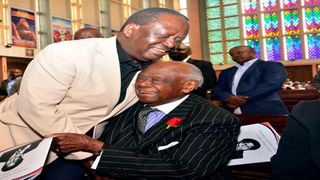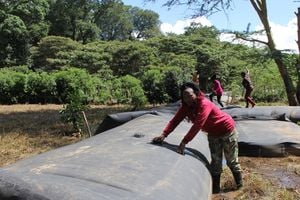
Orange Democratic Movement leader Raila Odinga with former Attorney General Charles Njonjo during the 50th memorial service of Tom Mboya Holy Family Basilica on July 5, 2019.
| File | Nation Media GroupNews
Premium
Charles Njonjo, Odingas never saw eye to eye before failed Air Force coup
Mr Raila Odinga was a detainee in 1984 when he gave damning testimony to a commission that precipitated the fall of Charles Njonjo and fresh interviews now shed light on why the two later buried the hatchet.
Senior Counsel Paul Muite, who represented Njonjo at the judicial commission appointed to investigate allegations he plotted to overthrow President Moi’s government, yesterday told of a meeting between Mr Odinga’s father, Jaramogi Oginga Odinga, and Njonjo that subsequently saw a thawing of relations even with the younger Odinga.
But Jaramogi and Njonjo weren’t always the best of friends either. During their time, Njonjo and Jaramogi served the same government of President Jomo Kenyatta but articulated different political ideologies.
While Jaramogi advocated social democracy, Njonjo favoured a capitalist approach. This, coupled with competition for power, led to an acrimonious falling-out that saw Njonjo say nasty things about Jaramogi.
But Muite, a former Kabete MP, says that despite the bad blood between the two, they would later enjoy a good rapport that extended to Mr Raila Odinga.
“It’s not just the late Njonjo having a good rapport with Mr Odinga. It started with Mr Odinga’s father in 1983,” says Mr Muite, as he recalled an unusual show of camaraderie between the two at the venue of the commission’s proceedings.
The commission, chaired by Justice Miller, had begun sittings in October 1984 at the Old Chamber in Parliament Buildings.
Embraced Njonjo
“Oginga came to the inquiry in Parliament and I was there when he warmly embraced Njonjo. They had a hearty talk just before the commission proceedings started,” says Muite, one of the counsels for Njonjo in the commission alongside William Deverell, who went on to become High Court judge.
“In 1990, Jaramogi asked me to arrange for a meeting with Njonjo at his Muthaiga residence. I did that and the two met and talked, though I may not tell what they talked because I was not in that meeting,” recalls Muite.
It’s not clear why it took Njonjo and Oginga about seven years to meet after the “embrace” in Parliament. Nonetheless, the Muthaiga meeting happened, according to Muite.
This was notwithstanding the fact that Njonjo had said very nasty things about Mr Odinga’s father, including not imagining shaking Oginga’s hand and vowing not to visit Kisumu for fear of contracting cholera. The disease was prevalent in the lakeside region in the 60s and 70s.
Animosity
By virtue of his position and influence in government, Njonjo was closely associated with bad things that happened against Mr Odinga and his father, including detention without trial that was subjected to father and son.
The animosity between the two politicians boiled over in 1982.
Information from the court martial that tried the Air Force officers implicated in the attempt to overthrow President Daniel Moi’s government, revealed two coups were being plotted—one by the renegade Air Force officers and another by Njonjo.
The Njonjo coup was to happen on August 1, 1982, as Mr Odinga testified before the Miller-led commission. The Air Force one was scheduled for August 9, 1982.
However, when the Air Force men learnt of Njonjo’s coup plan, they decided to bring their famous failed coup to August 1. Mr Odinga, who was detained for his alleged role in the planning and execution of the coup, testified against Njonjo as a state witness.
The commission’s report captures Mr Odinga’s substance of his four statements against Njonjo recorded with the police.
"I stated that I had received information to the effect that Mr Njonjo had made plans to overthrow the Government of Kenya with the aid of South African and Israeli mercenaries and the General Service Unit (GSU),” says Mr Odinga. “To this effect, substantial amounts of arms had been smuggled into the country. Some of these arms were kept somewhere in the Aberdares and the said coup was planned to take place on August 5, 1982.
“I also stated that the same source had said that several South Africans and Israeli agents had come into the country to make arrangements for the coup."
At the time of Mr Odinga's testimony on July 26, 1984, he was a lawfully detained person since March 23, 1983. He was picked up by police for interrogation after the disturbances of August 1, 1982. Mr Odinga told the commission he had a conversation with one Kiprono arap Keino, who was the deputy speaker of the National Assembly, in the gymnasium of the Hilton Hotel, Nairobi, during March, 1982.
They were friends, having met in Germany in the early 60s. The two began discussing politics in general. Mr Odinga told Keino that there were certain cliques in the government who were attempting to intimidate and muzzle Parliament, “which was not in the best interest of the country”.
Keino retorted: "I know you people do not like Njonjo."
By “You people", Keino meant the Luo community, the report explains.
The report captures Mr Odinga telling Keino that Luos had no reason to like someone who had once said that he couldn’t shake hands with them.
“Keino replied that whether the Luos liked it or not, Njonjo would make it as the next president of this country,” the report states. But how did Mr Odinga make up with Njonjo? Ms Ruth Odinga, Mr Odinga’s younger sister, said she could not recall the events at the time as she was young to understand what was happening.
“I cannot tell you exactly what happened because I was young,” Ms Odinga said, referring to this writer to Mr Oburu Oginga, their eldest brother.
“The person who will tell you everything is our elder brother, Oburu. Just call him.”
However, we could not reach Mr Oburu as his phone was switched off at the time. He did not also respond to text messages.
Reconciliation triggers
But according to Mr Muite, who would later become a close confidant of Oginga, also as his vice chairman in Ford Kenya party, after meeting Oginga, “it was only natural that Njonjo would extend the embrace to Mr Odinga.”
“Subsequently there appeared to be a cooling off between Mr Odinga and Njonjo. Though I never got to discuss this with Njonjo. But I can say that Njonjo supported Mr Odinga morally, financially and otherwise in his political career,” says Mr Muite.
It was about 2003, the friendship between Njonjo and Mr Odinga started manifesting in the open. They would occasionally be seen in public places together. In 2007, Njonjo chose Mr Odinga over President Mwai Kibaki in the presidential election.
And Njonjo had no qualms backing Mr Odinga against his long-time political rival Mr Kibaki. The conflict between Njonjo and Kibaki had deepened in the early days of Mr Moi’s presidency.
Njonjo, who had vanquished a clique that had sought to block Mr Moi from succeeding President Kenyatta following his death in 1978, and the diminutive Assistant Minister G.G. Kariuki rode in the presidential limousine, prompting some Moi handlers to suggest the two disrespected the President.
“People were asking, ‘who is the president? Is it Moi, Njonjo or Kariuki,” John Keen, then an assistant minister, told Moi’s biographer Andrew Morton.
By this time, according to Morton, there was talk that Mwai Kibaki, then vice-president, might leave for a World Bank position.
Njonjo, who at the time had joined Parliament as Kikuyu MP, an election that enabled his appointment as Constitutional Affairs minister, was consolidating his power base.
By 1980, two groups had emerged in Kanu—one led by Mwai Kibaki and another by Njonjo. “Obviously, Kibaki was very nervous, because he thought that I was going to take over his job. I did not want the post of vice-president,” Njonjo told Morton.
He claimed that the bad blood between him and Kibaki started the day he suggested to Moi that Kibaki become vice-president. That evening, he went to break the news to Kibaki at his Muthaiga home. “From that day on, Kibaki became my enemy,” claimed Njonjo.
2007 polls
Apparently, it’s the disdain for Kibaki that would partly see Njonjo support Odinga in the 2007 presidential election.
Former Subukia MP Koigi Wamwere says Mr Odinga and Mr Njonjo reconciled just like politicians would do because after all, Njonjo had fallen from power following his sacking from the Cabinet by President Moi.
“He was in the opposition with Mr Odinga and the two were no longer fighting each other,” says Mr Wamwere.
“If you hold such a position and the government is detaining people it wants to get rid of, then, definitely, you are involved! The crimes against the people incarcerated were collective and not individual,” Mr Wamwere says of Njonjo.





